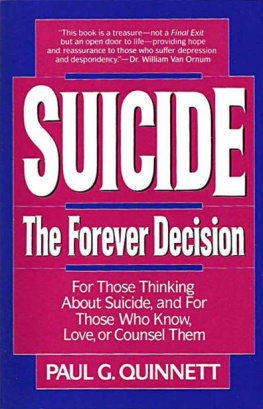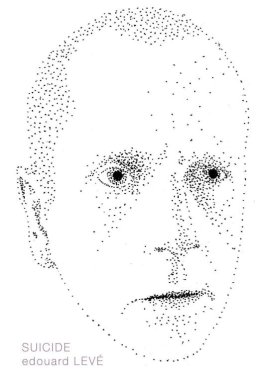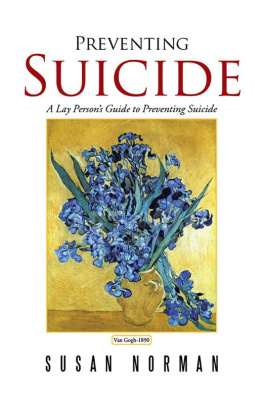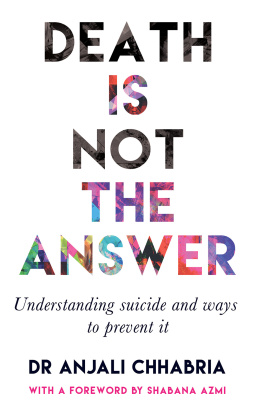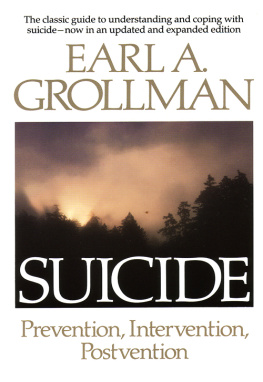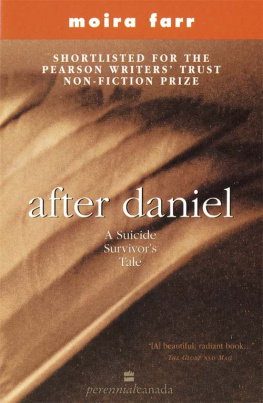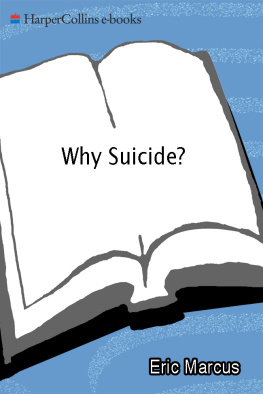Paul G. Quinnett - Suicide: The Forever Decision
Here you can read online Paul G. Quinnett - Suicide: The Forever Decision full text of the book (entire story) in english for free. Download pdf and epub, get meaning, cover and reviews about this ebook. year: 1992, publisher: The Crossroad Publishing Company, genre: Religion. Description of the work, (preface) as well as reviews are available. Best literature library LitArk.com created for fans of good reading and offers a wide selection of genres:
Romance novel
Science fiction
Adventure
Detective
Science
History
Home and family
Prose
Art
Politics
Computer
Non-fiction
Religion
Business
Children
Humor
Choose a favorite category and find really read worthwhile books. Enjoy immersion in the world of imagination, feel the emotions of the characters or learn something new for yourself, make an fascinating discovery.
- Book:Suicide: The Forever Decision
- Author:
- Publisher:The Crossroad Publishing Company
- Genre:
- Year:1992
- Rating:4 / 5
- Favourites:Add to favourites
- Your mark:
- 80
- 1
- 2
- 3
- 4
- 5
Suicide: The Forever Decision: summary, description and annotation
We offer to read an annotation, description, summary or preface (depends on what the author of the book "Suicide: The Forever Decision" wrote himself). If you haven't found the necessary information about the book — write in the comments, we will try to find it.
Suicide: The Forever Decision — read online for free the complete book (whole text) full work
Below is the text of the book, divided by pages. System saving the place of the last page read, allows you to conveniently read the book "Suicide: The Forever Decision" online for free, without having to search again every time where you left off. Put a bookmark, and you can go to the page where you finished reading at any time.
Font size:
Interval:
Bookmark:
SUICIDE
The Forever Decision
For Those Thinking About Suicide,
and For Those Who Know, Love,
or Counsel Them
Paul G. Quinnett
Disclaimer
Both author and publisher wish the reader to know that this book does not offer mental health treatment, and in no way should be considered a substitute for consultation with a professional.
The identities of the people written about in this book have been carefully disguised in accordance with professional standards of confidentiality and in keeping with their rights to privileged communication with the author.
Introduction
Dear Reader,
If you are reading this book because you are having suicidal thoughts, I want to ask you a question: Would you be willing to consider the possibility that there might be another solution to your problems, pain, and suffering other than suicide?
If your answer is "yes" or even "maybe," that is good enough!
I don't know who you are or why you are reading these words. I only know that you have picked up this book and, for the moment, you are reading it. It is my hope that if you need this book, you will continue to read it.
As an author, it would help me a great deal to know more about you. But I don't and, unless we meet sometime someplace, we can never know one another. So we are stuck right here in the beginning. We are strangers and that is the way things will be between us. But this should not stop us. At least, it will not stop me.
I am going to write this book directly to you, as if you were sitting with me in my office. My office is a warm room. It is quiet and private. We have comfortable chairs and the phone doesn't ring. No one will disturb us in my office. It is the office in which I do what psychologists often dolisten to people, talk with them, and try to help them with life's problems.
At the outset I must assume a couple of things about you. While it is dangerous to make assumptions about people, because of our relationship, I will have to do it. I will assume that because you are reading this book, you have thought about taking your own life, that you have already attempted to do so, that you know someone who died by suicide, or that you are worried about someone.
If you have had, or are having, thoughts of suicide, I will assume you are greatly troubled. No one in good physical and mental health thinks about suicide, except as an academic exercise. Only the truly anguished and distressed seriously consider ending their lives.
Assuming this to be true of you, I am going to talk to you about the pain of living and the consequences of dying, so far as I know about them. I am going to talk to you about suicide. Because your life is at stake, I am not going to fool around. I am not going to kid you. I am not going to mince words. Rather, I intend to be just as honest and straightforward as I know how to be.
Because I have known many people who have wanted to kill themselves and too many who have killed themselves, I have some idea of what kind of mood you are in at the moment. I know you may not be up to reading a long, tedious book. But maybe you could read this one. I promise I will keep it short.
One of the reasons I have written this book is that suicide is an unpleasant topic. People do not like to talk about it. They do not like to hear that another human being is so troubled that he or she is considering self-destruction. But this silence is not good for us. It is not good for the troubled person and it is not good for those who avoid the fact that someone is so desperate and alone that ending his or her life seems to be the only solution. It is time we talked, and talked candidly.
Some people may argue that a book of this kind should not be written and that, somehow, talking plainly about suicide will increase the chances that a reader may die by suicide. I do not believe this is true, and several research studies support my opinion. I can think of no problem that is solved by not talking about it.
Rather, it is my feeling that the more we learn about dying, the more we learn about living. And when we have learned more about both, maybe we are better able to fully live all of life. As I have told many of my suicidal patients, "A suicide crisis is a terrible thing to waste. What can we learn from whats happening right now that will make your life not just tolerable, but wonderful?"
Another reason I have written this book is that many people kill themselves without ever knowing that help was just a phone call or a text message away. You may wonder, in this modern age, how this can be. But it is true. The World Health Organization estimates that of the approximately one million people who take their own lives each year in the world, only about 15% ever have a single counseling session with someone knowledgeable, compassionate, and competent to help them to understand what is happening in their head and heart.
Maybe this book will find its way into the hands of someone who never knew help was there or where to find it. Maybe this book will give someone that little bit of courage they need to ask for that help, or to hold on for another day or another week, or until their life changes for the better and the thoughts of suicide begin to fade.
Just one more note. I do not have any magic answers or quick solutions to life's problems. I don't think anyone does. So I won't offer you any easy ways of living or simple solutions to the pain and suffering that seem to be a part of all of our lives. But because this book is about suicide and nothing less than your life is at stake, I won't apologize for what I have to say to you that you may not like. For all I know, this book may be the last thing you ever read.
Paul Quinnett
Chapter 1
You Don't Have to Be Crazy
The first thing I want to tell you about suicide is that you don't have to be crazy to think about it or, for that matter, even to try it. Suicide is a solution. No matter what anyone tells you, suicide does solve problems; at least, it solves your problems. And if you succeed, it solves them once and for all. As you have no doubt already figured out, once you are dead, nothing can hurt you anymore. Once you are dead, you are beyond feeling badly. Once you are dead, you can't possibly care what happens anymore. Whatever pain you are in, it will end just as soon as you stop breathing. Since there is no point in kidding each other right here in the beginning, I won't argue with you that suicide doesn't work. It does. Or at least it seems to.
Before this time in your life, my guess is that when you heard people say they felt like killing themselves, you thought they were crazy. If you are in that place right now, maybe you can see how they felt. Most people will say you are crazy for thinking about suicide. Or, if you kill yourself, they will say you must have been crazy to have done it.
But the truth is that most people who kill themselves are not mentally ill, at least not in the way we think of people who are "out of their minds." Yes, people who are psychotic sometimes kill themselves, but most people who die by suicide are people just like you and me; people who, for reasons I hope you will explore with me, have decided that life is just not worth living anymore.
The great majority of people who attempt or complete suicide are so sad, hopeless, or angry that they simply can't stand life anymore. Or they have been dealt such a terrible blow by life that they are overwhelmed and can see no other way to end the feelings of loss, stop the suffering, and regain control over their future. But they are not crazy. And, most likely, neither are you.
Later in this book, I will talk in detail about depression, loneliness, anger, hopelessness, and stress, and how these states of mind can influence us and trigger our thoughts of suicide. But for the moment, I encourage you to try to read the book through from front to back so that you will understand the hows, the whys, and all the risks and consequences of trying to kill yourself.
Next pageFont size:
Interval:
Bookmark:
Similar books «Suicide: The Forever Decision»
Look at similar books to Suicide: The Forever Decision. We have selected literature similar in name and meaning in the hope of providing readers with more options to find new, interesting, not yet read works.
Discussion, reviews of the book Suicide: The Forever Decision and just readers' own opinions. Leave your comments, write what you think about the work, its meaning or the main characters. Specify what exactly you liked and what you didn't like, and why you think so.

